(word完整版)新目标英语八年级下人教版课文原文WORD版UNIT2
八年级下册英语第二单元大课文
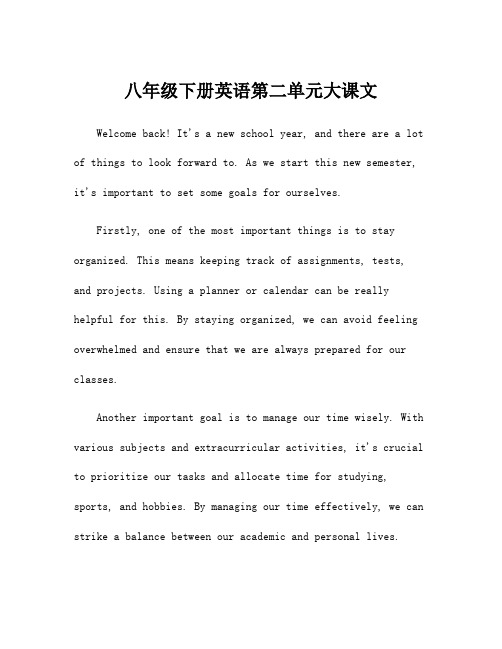
八年级下册英语第二单元大课文Welcome back! It's a new school year, and there are a lot of things to look forward to. As we start this new semester, it's important to set some goals for ourselves.Firstly, one of the most important things is to stay organized. This means keeping track of assignments, tests, and projects. Using a planner or calendar can be really helpful for this. By staying organized, we can avoid feeling overwhelmed and ensure that we are always prepared for our classes.Another important goal is to manage our time wisely. With various subjects and extracurricular activities, it's crucial to prioritize our tasks and allocate time for studying, sports, and hobbies. By managing our time effectively, we can strike a balance between our academic and personal lives.Furthermore, setting academic goals is essential. We can aim to improve our grades in certain subjects, participate more in class discussions, or seek help when we face challenges. By setting and achieving these goals, we canbuild confidence and a sense of accomplishment.In addition, let's not forget to focus on our social goals. Making new friends, being kind to others, and participating in group activities are all important aspects of our school experience. Building relationships and being a positive influence on our peers can create a supportive and enjoyable school environment.Lastly, it's important to maintain a positive attitude. School can be challenging at times, and setbacks are inevitable. However, by staying positive and resilient, we can overcome obstacles and continue to grow and learn.In conclusion, as we embark on this new school year,let's remember to stay organized, manage our time wisely, setacademic and social goals, and maintain a positive attitude. By doing so, we can make the most of our school experience and achieve success both academically and personally. Here's to a great semester ahead!。
人教版新课标英语八下unit2

人教版新课标英语八下unit2人教版新课标英语八年级下册第二单元通常围绕一个主题展开,这个主题可能是日常生活、学校生活、节日、文化习俗等。
以下是该单元可能包含的内容:Unit 2: Daily Routines and HabitsSection A1. Vocabulary- Words related to daily routines: wake up, brush teeth, have breakfast, go to school, have lunch, come back home, do homework, watch TV, go to bed.- Phrases for expressing habits: usually, always, sometimes, never.2. Reading- A reading passage describing a typical day in the life of a middle school student, highlighting their daily routines and habits.3. Grammar Focus- Simple present tense for habitual actions and states.- Use of adverbs of frequency.Section B1. Listening- A dialogue between two students discussing their daily routines and comparing their habits.2. Speaking- Role-play activities where students interview each other about their daily routines and share their findings with the class.3. Writing- A writing task where students describe their own daily routines and compare them with a partner's.Section C1. Reading for Pleasure- A short story about a character who has a unique daily routine and how it affects their life.2. Grammar Practice- Exercises to practice the simple present tense and adverbs of frequency.3. Cultural Corner- Information about daily routines and habits in different cultures around the world.Section D1. Vocabulary Review- A review of the vocabulary introduced in the unit with matching and gap-fill exercises.2. Grammar Review- A review of the grammar points with a focus on the simple present tense and adverbs of frequency.3. Project- A project where students create a poster or a presentation about their ideal daily routine, incorporating elements from different cultures.Assessment- A quiz to test students' understanding of the vocabulary, grammar, and concepts covered in the unit.请注意,以上内容是基于常见的教学单元结构和主题进行的假设性描述,具体内容可能会根据实际教材有所不同。
初中英语人教版八年级下册Unit 2 The 1st period
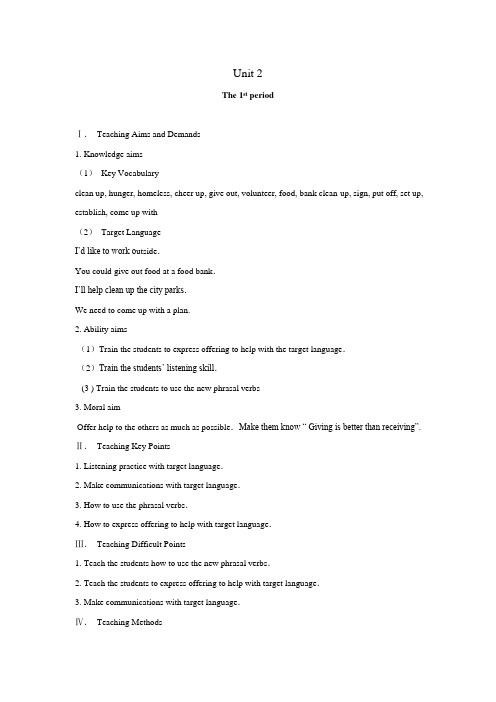
Unit 2The 1st periodⅠ.Teaching Aims and Demands1. Knowledge aims(1)Key Vocabularyclean up, hunger, homeless, cheer up, give out, volunteer, food, bank clean-up, sign, put off, set up, establish, come up with(2)Target LanguageI’d like to work o utside.You could give out food at a food bank.I’ll help clean up the city parks.We need to come up with a plan.2. Ability aims(1)Train the students to express offering to help with the target language.(2)Train the students’ listening skill.(3 ) Train the students to use the new phrasal verbs3. Moral aimOffer help to the others as much as possible.Make them know “ Giving is better than receiving”.Ⅱ.Teaching Key Points1. Listening practice with target language.2. Make communications with target language.3. How to use the phrasal verbs.4. How to express offering to help with target language.Ⅲ.Teaching Difficult Points1. Teach the students how to use the new phrasal verbs.2. Teach the students to express offering to help with target language.3. Make communications with target language.Ⅳ.Teaching Methods1.Teaching by giving sample sentences and making up sentences.2. pair-work3. task-based activityⅤ.Teaching Aids1. A tape recorder2. Ppt.ProceduresStep 1 Lead-inDo you know the sentence “ Giving is better than receiving” ? Have you heard of Uncle Lei Feng? He always volunteered his time to help other people. He gave out his money he saved to homeless persons, helped to fix up cars and so on. He set a good example for us.Now look at these picture . What should we do for them?1. They are homeless and hungry.2. They can’t afford to pay for their education.Do you want to be a volunteer to solve the problems.Look at these pictures, there are many ways to help people1.You could help clean up the city parks2.You could cheer up the old people.Step 2 1a Group-workLook at the bulletin board on page 60 and read about ways by which you could help people. Then list other ways you could help people.At last, ask some students to share their ideas with the class.Write any new words or phrases on the board and explain these words to the class, if necessary.Step 3 1b listen and complete the sentence.Call the students’ attention to the sentences in the box in Activit y lb.Ask students to read the sentences by themselves. Explain any new words and phrases in it.Make sure that all the students can understand the meanings of the eight items.Ask them to listen carefully and fill in the blanks. Listen again and check the answers.Step 4 pair-workRead the instructions with the class.Call their attention to the example in the speech bubbles in Activity la.Ask a pair of students to read this conversation to a class.Then let them practice in pairs using the information in 1b.Encourage them to make up new drills.Step 5. 2aWe can see five pictures in Activity 2a.What can you see in each picture?Ask five different students to describe the pictures.After that, ask a student to read the words on the TV screen, on the sign and in the newspaper.Play the recording the first time.Students only listen.Play the recording again.Ask students to check the things they hear.Check the answers.Step 6 2bRead the instructions with the class.And let them have a look at the sentences.Read the first sentence to the students.Tell them it is a sample answer.Say, We will hear the same recording again.This time listen carefully to what the students say and fill in the blanks in the sentences.Play the tape again and the students write out the answers.Check the answers.Step 7. 2c Role playLei Feng Day is two weeks from now. We need to come up with a plan. What would you like to do? Talk with your partner and come up with a planAsk one or two pairs to say their conversations to the class.Step 8 Oral practiceThe Olympics is coming. If you are a volunteer , what will you do?Step 9 Grammar FocusSay, Do you remember the meaning of cheer up? Who can tell us?Ask a student to explain the phrasal verb cheer up like this:Cheer up means make someone happy.Then get students to make up some sentences with it.Say, Let’s learn some more phrasal verbs today.Please open your books at page 61.Look at the content in Grammar Focus and try to tell me the meanings of set up and come up with.Ask two children to tell their meanings like this:Set up means establish or start.Come up with means think up.Then get students to read the sample sentences in the grammar box.Write the phrasal verbs and the sentences on the blackboard.Get students to make more sentences with these phrasal verbs to get a further understanding.Step 10 HomeworkWrite down the essay “I am a volunteer of Olympics”Blackboard DesignUnit 2 I’ll help clean up the city parks1. vocabulary cheer up I’d like ----clean up homeless You could ---give out hunger I’ll ----put off establishset up advertisementthink outThe 2nd PeriodⅠ.Teaching Aims and Demands1.owledge Objects(1)Key Vocabularymajor, commitment, veterinarian, coach(2)Target LanguageI’d like to join the school volunteer project..You could help coach a football team for little kids.2.ability ObjectsTrain students’ reading skill.Train students’ speaking skill with target language.Train students’ writing skill with target language.3.Moral ObjectIf there is a student volunteer project in your school, try to join it; if not, try to set up one; being a volunteer is great!Ⅱ.Teaching Key Points1.Guide students to read the article in Activity 3a.2.Help students to use the target language to express what kinds of volunteer work they could do and what they like to do.1.Teaching Difficult Points1.Read the article for comprehension.e the target language to express what kinds of volunteer work they could do and what they like to do.Ⅳ.Teaching Methods1.Pairwork2.Role playⅥ.Teaching ProceduresStep Ⅰ Revision1.Check the homework by asking some children to read their conversation.2. Check the homework by asking some children to share their sentences with the phrasal verbs with the class.3. Revise the target language they learned last class.Step Ⅱ 3aHave the students look at the picture of the three children.Ask them who they think the children are.Then call the stude nts’ attention to the title of the article and ask the children to read it out.Ask them the question again.This time they may answer.They are three volunteers.Read the instructions to the students.This is an article about volunteers.You have two tasks to do: first underline the kinds of work the volunteers do; second circle the reasons why they like their work.Continue saying.The names of the three volunteers are Li Huiping, Lan Pei and Zhu Ming.The article tells you about the different things they do to help people.Please read the article the first time and underline the things they do.There are three questions on the blackboard to help you.Write the three questions on the blackboard and tell them to scan the passage to get the answers and underline the words.Questions1.What does Li Huiping do to help people as a volunteer?2.What does Lan Pei do?3.What does Zhu Ming do?Check the answers by asking three students to answer the questions.Read the article to the class and do some explanation on any new words.Tell the students to raise their hands when I come to any word or sentence they don’t understand.Pause and do some explanation.Try to explain the new words in English like this: major means more important, for example, a major operation, the major roads; A veterinarian means an animal doctor, a doctor who treats animals.After that, get the students to read the article a second time to circle the reasons.Check the answers with the class.Then have the students read the article loudly twice.Encourage them to ask questions if they still can’t understand any words or sentences.Step Ⅲ 3bfill the results of their discussions in the blanks.Ask several pairs to report their answers to the class.Answers will vary but should show a sense of volunteering as well as a relationship to the skill.They may give answers in completely sentences orally but write in phrases.Step Ⅳ 3cAsk a pair of the students to model the sample conversation first.Write the conversation on the blackboard.Model for the rest of the class.Then let the whole class practice in pairs.Remind them to use the sample conversation, but replace the words loves and skills.Move around the classroom while they are working, checking the progress and offering help as necessary.Ask two or three pairs to share their conversations to the class.Step Ⅴ Part 4Get the students to write down their own answers individually.As students write, move around the room helping with vocabulary if necessary.Show some pictures of volunteers’ work to remind them as well.Ask several to read their things they like to do to the class.Then work in pairs and give each other suggestions about what volunteer work you could do with those interests.Ask a pair to model the sample conversation before they begin to practice.Get students to practice in pairs.After all of them have finished writing, ask one or two pairs to share their conversations to the class.Step Ⅵ SummaryIn this class, we’ve learned more about the volunteers and their work.And we’ve done much oral and written practice on volunteer work with target language.Step Ⅶ Homework1. Write a conversation like the sample on in Activity 3c.2. Write a conversation like the sample one in Activity 4.Step Ⅷ Blackboard DesignThe 3rd PeriodⅠ. Teaching Aims and Demands1.Knowledge Objects(1)Key Vocabularyrun out of, take after, fix up, give away, repair, not…any more, similar advertisements,call up, hand out, call-in(=phone in), strategy, work out.(2)Target LanguageWhat do you do, Jimmy?I fix up bikes and give them away.2.Ability Objects(1)Train the students’ reading, writing, s peaking and listening skills with the target language.(2)Train the students to use the new phrasal verbs.3.Moral ObjectCome up with a good idea to help others.It will bring you much enjoyment.If you get in trouble in your volunteer work, go to the people around you to ask for help.Ⅱ. Teaching Key Points1.Train the students’ reading, writing, speaking and listening skills with the target language.2.Teach the students to use the new phrasal verbs properly.Ⅲ. Teaching Difficult PointTeach the new phrasal verbs.Ⅳ. Teaching Methods1.Making up sentences2. Listening3.PairworkⅤ. Teaching AidA tape recorder, ppt.Ⅵ. Teaching ProceduresStep I RevisionCheck the homework and important drills and phrases have learned alreasy.Step Ⅱ 1aRead the instructions to the students.Make sure that each one knows what to do.Let the students look at the sentences in the left column first.Try to explain the four sentences in English for the children, especially the new phrasal verbs in the sentences.Say to them like this: Please look at the sentences on the left column.Let’s get the meanings of them.Let’s see the first one.I’ve run out of itHere, run out of is a phrasal verb.It means reach an end of, use up or become short of.I’ve run out of it, means I’ve used it up, nothing left.Explain the other sentences in the same way.Ask students to match the sentences with similar meanings.Say, Now match the numbered sentences with the lettered sentences in the box.Step Ⅲ 1bCall the students’ attention to the ph rasal verbs in the box.Have four different students explain each phrases in their own words.Make sure each student knows the phrasal verbs’ meanings.Ask two or three students who have put up their hands to say their sentences to the class.Correct any mistakes they may make.Then have the students work individually.Make one sentence with each phrasal verb in the box.Tell them to write down their sentences on the lines next to the box.Walk around the classroom as they write.Offer some help to them if they need.Try to remember who have made some wonderful sentences at the same time.After all of them have finished writing, choose some children who have made some wonderful sentences to share theirs with the class.Choose some of the best sentences.Write them on the blackboard.At last, ask the whole class to work in pairs and help each other.Let them check each other’s sentences very carefully.Correct all the mistakes in writing or sentence structures that their partners’ may have made.Step Ⅵ 2aCall the students’ attention to the four pictures.Tell them the boy’s name is Jimmy.Read the instructions to the class.Your task is to number the pictures the correct order while you are listening to the conversation on the tape.But I want to ask you to guess the answer without listening now.Try to put the four pictures in a certain order to show a story of Jimmy by yourselves now.I’ll see whose answers and correct after we finish doing the listening practice.Then have them give their own order by guessing.After a while, ask several ones to tell their answers to the whole class.Collect two or three answers which many students support on the blackboard.Next, ask some students to tell their own stories on the pictures according to their own orders.After that, ask the students to get ready to listen.Say, We will hear a radio program.A man is interviewing a boy.Write a number in each short line next to each picture while you are listening.Your numbers should be from 1 through 4 and show which thing they talk about first, second, third and fourth.Play the recording the first time.Students only listen.Then play the recording again.Ask students to number the pictures.Check the answers.Remember to say congratulations to the children who guessed correctly.Step Ⅴ 2bAsk four students to read the four sentences to the class.Point to the list of statements and true/false choices.We will listen to the same recording again.Before I play the recording, let’s do like this.—If you can remember the content s of the conversation, please write your answers; if you can’t remember the contents, please just guess the answers.It doesn’t matter whether your answers are right or wrong.After a while, have the students get ready to listen.Play the recording again.Ask the students to circle the correct answer to each question—T for true or F for false.Check the answer.Remember to say congratulations to the students who had a good guess before listening.Step Ⅵ 2c pair-workWork in groups and make dialogues use the information from 2a and 2b.Ask a pair of the students to read the model conversation.Then let them practice their own conversations in pairs.Ask several pairs to share their conversations with the class.Step Ⅶ 3aWe have learned something about Jimmy.We know he is a Bike boy.He fixes up old bikes and gives them away.But he ran out of his money to buy old bikes last week.Has he come up with any way of getting money? or Will he have to stop?Let’s find out the answer in the article in Activity 3a.Please read the article once quickly and tell me the answer.Have the students scan the passage and catch the main idea of it.After around two minutes, Ask the question again.Step Ⅷ 3bAsk a student to read the sample sentence in the book.Tell them to write out the things that Jimmy did.Use the sample sentence as a model.And they can reread the article to search for the answers.Let the students complete the work on their own.After they all finish writing, ask a few students to give their answers.Part 4Let’s do it in groups of four.Each group will have to brainstorm a plan for helping out in your community.Talk about it and make notes on where you will help and what you will do.Each group has to write out your own list of possible places and volunteer activities first.Point out the chart in Activity 4. Tell them to note the two given statements Where and What.Your task is to write the places after the word Where and the volunteer activities after the word What.Show some pictures or signs on volunteer activities to help the children come up with some ideas.Let the students work in fours.Brainstorm their plans and write their own lists, using the answers on the blackboard as a model.Let them practice for a while.Then ask each group to make their presentationsHomework1. Make one sentence with each of the phrasal verbs below, call up, hand out, work out, run out, set up fix up.Blackboard designUnit 2 Section BVocabulary Target language:fix up My bike is broken. I have it fixed up A : What do you do, Jimmy?give away -------------- B:I fix up bikes and give them awatake after ----------------------run out of ----------------------The 4th PeriodⅠ.Teaching Aims and Demands1.Knowledge Objects(1)Using these phrasal verbs correctly.give away, take after, come up with, give out, hang out(2)Writing an article using the notes given2.Ability Objects(1)Train the students to use the phrasal verbs.give away, take after, come up with, give out and hang out.(2)Train students’ writing skill.3. Moral ObjectWhat do you want to be in the future? Try to come up with an idea to get much volunteer experience.It will be good for both you and the others.Ⅱ.Teaching Key Points1.Help the students have a self check on the key words and target language of this unit.2.Practice using the phrasal verbs give away, take after come up with, give out and hang out.3.Direct the students to write an article according to the notes given.Ⅲ.Teaching Difficult Points1.The students make sentences with the phrasal verbs.2.Write the article with the notes given.Ⅳ.Teaching Methods1. Teaching by providing sample sentences2. Teaching by providing sample articleⅤ.Teaching Aida picture of a womanⅥ.Teaching ProceduresStep I Revision1.Check the homework by asking the children to show their sentences.Ask some to share their sentences with the class.2.Dictate some new words on page 64Step Ⅱ Part 1First let’s fill in the blanks.Look at the words given in the box.They are all phrasal verbs.Do you know the meaning of each phrasal verb? Help solve the problems.Do some explanation if necessary.Ask each student to make new sentences and write down on exercise book . Move around the room as they write, offering help as needed.Try to remember the common mistakes they may make.After they are finished, ask five different students to read their answers to the class.Correct any mistakes they may have made, especially the verb forms.Encourage the other students to point out their mistakes and help correct them.Point out the common mistakes they may have made at last.After checking the answers together, ask the whole class to check the answers in pairs, exchanging their books and have a careful check.Point out their partner’s mistakes and help correct themLet the students read the five sentences loudly several times after making sure they all have got right answers.Ask some students to share their sentences to the class by reading their sentences to the class.Correct any mistakes they may have made.Ask all the children to hand in their papersStep III. Part 2We’ll have to write an article using the notes in the box.The article will tell what happens to Sally.At first, let’s see the first sample sentence given in the book.Ask a student to read the sentence.Tell them to note how the writer combined these phrases into one sentence.Then tell the students to try to say out the next sentence.Let them think for a while first.Then ask several children to say their sentences.Then go on with the third sentence, then the fourth one.After combining the phrases into sentences orally, tell the students to put all the sentences together to write an article by themselves.Tell them to go on writing after the first sample sentence on their books.Move around the classroom.Note to remember whose articles are very successful and whose have some mistakes.Then ask some students who have written successfully to read theirs.At last, the teacher reads the sample article in the teacher’s book to the class, showing a picture in which a young woman is singing.Ask the students to rewrite their articles to make the article perfect after class.Step Ⅳ Just for Fun!Look at the pictures and encourage students to make a story . They can continue storyFor example,A: I’ve been trying to cheer him up for twenty minutes. He won’t stop crying. Hi ! Why are crying? What makes you so sad?B: I’m not sad. I’m crying because of the onions.A: Next time you’d better cut them in water.B: Thank you. I’ll have a try next time.Some days laterA: Does it help to cut the onions in water?B: Yes, I don’t cry any more. But I can’t stay for a long time. I can’t breathe.Step Ⅴ Homework1.Revise all the language points in this unit.2.Finish off the exercises on pages 32~34 of the workbook.3.Make another more sentence with each phrasal verbs below, give away, take after, come up with, give out, hang out.4.Rewrite the article.Blackboard designUnit 2 I’ll help clean up the city parks.Self checkAnswers to Activity 1:1. give out 2.came up with3. gave away 4.hang out5. takes afterSome sample sentences to Activity 1:1. Jimmy gives away old bikes to children who don’t have bike s.2. Tom takes after his uncle.3. The boy has come up with a good plan to enjoy his holiday,4..The volunteers are giving out the advertisements now.5. Ladies always like hanging out at the shops on weekends.The 5th Period Reading: I’ll send you a photo of lucky.Ⅰ.Teaching Aims and Demands1.Knowledge Objects(1)Key Vocabularyset up , cheer up, run out of , help out, and so on.(2)Text2.Ability ObjectsTrain students’ ability of identify main idea.Train students’ ability of understanding words in context.Train students’ ability of reading for special information.3.Moral ObjectHelping the disabled people is necessary and we should support the me or organization. Ⅱ.Teaching Key Points1. Key vocabulary.2. Read the text to identify main idea.3. Read the text to understand words in context.4. Read the text for special information.Ⅲ.Teaching Difficult Points1. Train students’ reading skill.2. Train students’ writing skill.Ⅳ.Teaching ProceduresStep Ⅰ Part 1At present there are many ways to communicate to our friends. If you want to tell some to your friends , what way will you use ? Talk about it in groups .Such as sending e-mails, telephoning or sending letters.Ask some groups to show their waysHow do we write a letter, pay attention to form.Step 2 Reading.While you read , if you don’t understand a word or phrase in English, ask yourself what part of speech it is. It might be a noun, a verb or a preposition, for example.Read the first time to find out the new words and difficult.Read again finish the exercise 3aRead the third time find some phrasal verbs and make up new sentences to finish exercise 3b. Use information in the letter to make true sentences by matching the different parts.Step 3 WritingAsk the students to read the article again and try to reply the letter in some ways like offering to help her more , saying why you are able to help or say what you could do to help.Ask them to talk about it in groups and the write it down.Homework1. Reserve the important drills and phrasal verbs2. preview the new unit。
新目标英语八年级下Unit2单元测试题及答案(含听力原文)

新目标英语八年级下Unit2单元测试题及答案(含听力原文)LT()14.When does a volunteer probably need to go to the food bank?A.On weekends. B.On Mondays.C.Every afternoon.()15.Where will the girl volunteer?A.At a food bank. B.In the hospital.C.In an after-school study program.Ⅳ.听短文,完成下面的表格。
每空一词。
(10分)16.________17.________18.________19.________ 20.________笔试部分(95分)Ⅴ.单项选择。
(15分)()21.—We should take good care of ________ old.—You're right.A.the B.a C.an D./()22.—Mary takes ________ her mother.—Yes.She is similar________ her mother.A.for;as B.to;with C.after;to D.away;from()23.My best friend always helps me ________ when I am in trouble.A.after B.out C.over D.with()24.—No one could answer the teacher's question except Linda.—Oh,she is really________!A.beautiful B.outgoingC.happy D.clever()25.—I really want to know ________ the people in the disaster area(灾区) are.—It is said that they have enough food and clothes.A.how B.where C.what D.who()26.Gina doesn't ________.She looks as beautifulas two years ago.A.finish B.decide C.change D.arrive()27.Old Henry lives ________.He often feels ________.A.alone;alone B.alone;lonelyC.lonely;lonely D.lonely;alone()28.—I have got a ________ that other workers don't like me.—It's not what you think.They are just too busy to talk with you.A.feeling B.letter C.decision D.journey()29.The good news of our basketball team winning the game ________ the whole class.A.cheered up B.put upC.got up D.looked up()30.—The article is really difficult.—Yes,it is.I can't ________ its meaning at all.A.read B.speak C.understand D.write()31.—What makes you ________ the job?—Because I'll move to another city.A.set up B.look for C.cut off D.give up()32.—We should ________ a plan for the garden party.—Yes,I think so.A.come up B.come up withC.catch up D.catch up with()33.His family ________ be really poor.But now they have much money.A.is used to B.was used toC.used to D.use to()34.—Do you know ________ look after a baby?—Sure,I always help my mom look after my little sister.A.what can B.what toC.how can D.how to()35.—I like to work with kids.—________.A.You can give out food to the old peopleB.You can help to clean the houseC.You can volunteer in the factoryD.You can help the kids with their studiesⅥ.完形填空。
英语八年级下unit_2《body_language》word重点内容整理
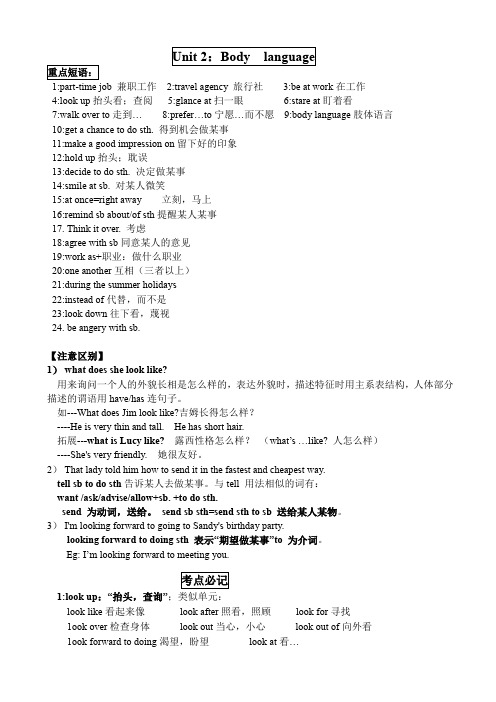
1:part-time job 兼职工作2:travel agency 旅行社3:be at work在工作4:look up抬头看;查阅5:glance at扫一眼6:stare at盯着看7:walk over to走到… 8:prefer…to宁愿…而不愿9:body language肢体语言10:get a chance to do sth. 得到机会做某事11:make a good impression on留下好的印象12:hold up抬头;耽误13:decide to do sth. 决定做某事14:smile at sb. 对某人微笑15:at once=right away 立刻,马上16:remind sb about/of sth提醒某人某事17. Think it over. 考虑18:agree with sb同意某人的意见19:work as+职业:做什么职业20:one another互相(三者以上)21:during the summer holidays22:instead of代替,而不是23:look down往下看,蔑视24. be angery with sb.【注意区别】1)what does she look like?用来询问一个人的外貌长相是怎么样的,表达外貌时,描述特征时用主系表结构,人体部分描述的谓语用have/has连句子。
如---What does Jim look like?吉姆长得怎么样?----He is very thin and tall. He has short hair.拓展---what is Lucy like? 露西性格怎么样?(what’s …like? 人怎么样)----She's very friendly. 她很友好。
2)That lady told him how to send it in the fastest and cheapest way.tell sb to do sth告诉某人去做某事。
(完整word版)人教版初中英语八年级下册课文

Unit 1:Where did you go on vacation?Section A 2d:Role-play the conversation.Rick: Hi, Helen. Long time no see.Helen:Hi, Rick. Yes, I was on vacation last month.Rick: Oh, did you go anywhere interesting?Helen: Yes, I went to Guizhou with my family.Rick: Wow! Did you see Huangguoshu Waterfall?Helen: Yes, I did. It was wonderful! We took quite a few photos there. What about you? Did you do anything special last month?Rick: Not really. I just stayed at home most of the time to read and relax. Grammar Focus:1. Where did you go on vacation? I went to New York City.2. Did you go out with anyone? No, No one was here. Everyone was on vacation.3. Did you buy anything special? Yes,Ibought something for my father./ No, I bought nothing.4. How was the food? Everything tasted really good!5.Did everyone have a good time? Oh, yes. Everything was excellent. Section B 2b阅读理解Monday, July 15th I arrived in Penang in Malaysia this morning with my family. It was sunny and hot, so we decided to go to the beach near our hotel. My sister and Itried paragliding. I felt like I was a bird. It was so exciting! For lunch, we had something very special –Malaysian yellow noodles. They were delicous! In the afternoon, we rode bicycles to Georgetown.There are a lot of new buildings now, but many of the old buildings are still there. In Weld Quay, a really old place in Georgetown, we saw the houses of the Chinese traders from 100 years ago. I wonder what life was like here in the past. I really enjoyed walking around the town.Tuesday , July 16th What a difference a day makes! My father and I decided to go to penang Hill today. We wanted to walk up to the top, but then it started raining a little so we decided to take the train. We waited over an hour for the train because there were too many people. When we got to the top, it was raining really hard. We didn’t have an umbrella so we were wet and cold. It was terrible! And because of the bad weather, we couldn ’t see anything below. My father didn ’t bring enough money, so we only had one bowl of rice and some fish. The food tasted great because I was so hungry!Unit 2:How often do you exercise?Section A 2d:Jack:Hi, Claire, are you free next week?Claire: Hmm...next week is quite full for me, Jack.Jack: Really? How come?Claire: I have dance and piano lessons.Jack: What kind of dance are you learning?Claire: Oh, swing dance. I’t s fun! I have class once a week, every Monday. Jack: How often do you have piano lessons?Claire: Twice a week, on Wednesday and Friday.Jack: Well, how about Tuesday?Claire:Oh, I have to play tennis with my friends. But do you want to come?Jack: Sure!Grammar Focus:6.What do you usually do on weekends? I always exercise.7.What do they do on weekends? They often help with housework.8.What does she do on weekends? She sometimes goes shopping.9.How often do you go to the movies?I go to the movies maybe once a month.10.How often does he watch TV? He hardly ever watches TV.11.Do you go shopping? No, I never go shopping.Section B 2b阅读理解:What Do No.5 High School Students Do In Their Free Time?Last month we asked our students about their free time activities. Our questions were about exercise, use of the Internet and watching TV. Here are the results.We found that only fifteen percent of our students exercise every day. Forty-five percent exercise four to six times a week. Twenty percent exercise only one to three times a week. And twenty percent do not exercise at all!We all know that many students often go online, but we were surprised that ninety percent of them use the Internet every day. The other ten percent use it at least three or four times a week. Most students use it for fun and not for homework.The answers to our questions about watching television were also interesting. Only two percent of the students watch TV one to three times a week. Thirteen percent watch TV four to six times a week. And eighty-five percent watch TV every day! Although many students like to watch sports,game shows are the most popular.It is good to relax by using the Internet or watching game shows, but we think the best way to relax is through exercise. It is healthy for the mind and the body. Exercise such as playing sports is fun, and you can spend time with your friends and family as you play together. And remember, “o ld habits die hard”.So start exercising before i’t s too late!Unit 3: I’m more outgoing than my sister.Section A 2d:Julie: Did you like the singing competition yesterday, Anna?Anna: Oh, it was fantastic! Nelly sang so well!Julie: Well, I think Lisa sang better than Nelly.Anna: Oh, which one was Lisa?Julie: The one with shorter hair I think she sang more clearly than Nelly. Anna: Yes, but Nelly danced better than Lisa.Julie: You can tell that Lisa really wanted to win, though.Anna: Well, everyone wants to win. But the most important thing is to learn something new and have fun.Grammar Focus:12.Is Tom smarter than Sam?No, he isn’t. Sam is smarter than Tom.13. Is Tara more outgoing than Tina?No, she isn’t. Tina is more outgoing than Tara.14. Are you as friendly as your sister?No, I’m not. I’m friendlier.15. Does Tara work as hard as Tina?Yes, she does.16. Who’s more hard-working at school?Tina thinks she works harder than me.Section B 2b阅读理解:Jeff Green:My mother told me a good friend is like a mirror. I ’m quieter and more serious than most kids. That’s why I like reading books and I studyharder in class. My best friend Yuan Li is quiet too, so we enjoy studying together. I’m shy so it’s not easy for me to make friends. But I think friends are like books –you don’t need a lot of them as long as they ’r e good.Huang Le:iIt’s not necessary to be the same. My best friend Larry is quite different from me. He is taller and more outgoing than me. We both like sports, but he plays tennis better, so he always wins. However, Larry often helps to bring out the best in me. So I ’m getting better at tennis. Larry is much less hard-working, though. I always get better grades than he does, so maybe I should help him more.Mary Smith:I don’t really care if my friends are the same as me or different. My favorite saying is,“A true friend reaches for your hand and touches your heart.”M y best friend Carol is really kind and very funny. In fact, she ’s funnier than anyone I know. I broke my arm last year but she make me laugh and feel better. We can talk about and share everything. I know she cares about me because sh’e s always there to listen.。
完整版新人教版新目标八年级下册英语Unit2 单元课件

【注意】 由need引出的疑问句,答语 表肯定时用must或have to;表示否定 时用needn't或don't have to。 A: Need I come to work tomorrow?
Unit 2
I'll help clean up the city parks.
Section A
Warming up
A guessing game
help
Do you often help others?
What other ways we could help people?
I helped to clean the classroom. I helped my parents with the chores. I _________________________. I _________________________.
昨天我收到了最新的CD播放器作为一份生 日礼物,真是梦想成真了。
to be
to carelearn to do
put off
call up come up with
put up hand out
give out
cheer up
to spend
to do to help
We're going to set up a food bank to help hungry people.
establish , start
We need to come up with some ideas.
think up
Unit 2 人教版新教材英语八年级下册
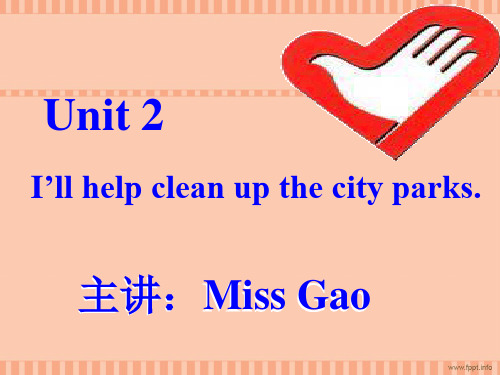
Practice the coversation
• Helen: …..making some plans …. an old…. summer. • Tom: ..?…. I did that….. • H: What did they ask…..? • T:…..things like reading…to the ….,or just talking… They told me..…past and how.….used… • H:…sounds… • T: Yeah, a lot of….lonely. We….listen …and care.. • H: … I mean, we are all going……one day,too.
3a
to be to learn to care to look to help to do
本课出现的动词短语:
clean up set up give out cheer up put off
打扫
call up
打电话
建立,建成 发放,派发
高兴,振作 提出 推迟,延后 分发
run out of 用尽 give up fix up
4 She could read by herself at the age of four. I could cook by独自地 myself (when I was ten) at the age of ten 在。。。岁在时候.
5 Volunteering here is a dream come true for me. 在这里当志愿者对我来说是梦想成真。 I got the latest CD player as a birthday present yesterday. It was just a dream come true! 昨天我收到了最新的CD播放器作为一份生 日礼物,真是梦想成真了。
人教版英语八年级下册第二单元课文汉语翻译
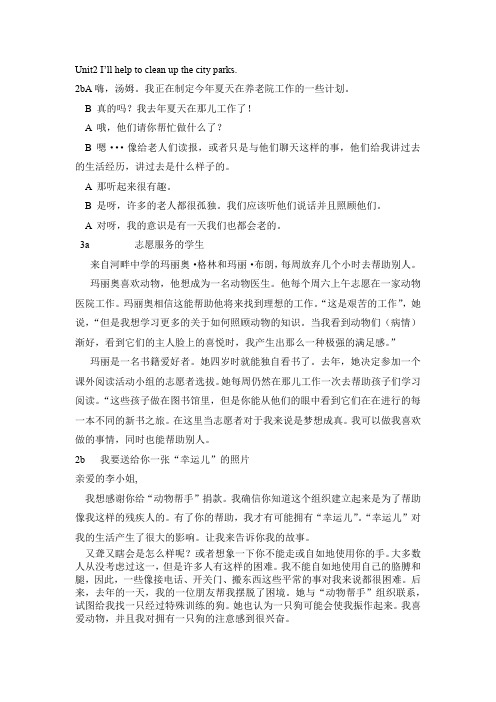
Unit2 I’ll help to clean up the city parks.2bA嗨,汤姆。
我正在制定今年夏天在养老院工作的一些计划。
B 真的吗?我去年夏天在那儿工作了!A 哦,他们请你帮忙做什么了?B 嗯···像给老人们读报,或者只是与他们聊天这样的事,他们给我讲过去的生活经历,讲过去是什么样子的。
A 那听起来很有趣。
B 是呀,许多的老人都很孤独。
我们应该听他们说话并且照顾他们。
A 对呀,我的意识是有一天我们也都会老的。
3a 志愿服务的学生来自河畔中学的玛丽奥·格林和玛丽·布朗,每周放弃几个小时去帮助别人。
玛丽奥喜欢动物,他想成为一名动物医生。
他每个周六上午志愿在一家动物医院工作。
玛丽奥相信这能帮助他将来找到理想的工作。
“这是艰苦的工作”,她说,“但是我想学习更多的关于如何照顾动物的知识。
当我看到动物们(病情)渐好,看到它们的主人脸上的喜悦时,我产生出那么一种极强的满足感。
”玛丽是一名书籍爱好者。
她四岁时就能独自看书了。
去年,她决定参加一个课外阅读活动小组的志愿者选拔。
她每周仍然在那儿工作一次去帮助孩子们学习阅读。
“这些孩子做在图书馆里,但是你能从他们的眼中看到它们在在进行的每一本不同的新书之旅。
在这里当志愿者对于我来说是梦想成真。
我可以做我喜欢做的事情,同时也能帮助别人。
2b 我要送给你一张“幸运儿”的照片亲爱的李小姐,我想感谢你给“动物帮手”捐款。
我确信你知道这个组织建立起来是为了帮助像我这样的残疾人的。
有了你的帮助,我才有可能拥有“幸运儿”。
“幸运儿”对我的生活产生了很大的影响。
让我来告诉你我的故事。
又聋又瞎会是怎么样呢?或者想象一下你不能走或自如地使用你的手。
大多数人从没考虑过这一,但是许多人有这样的困难。
我不能自如地使用自己的胳膊和腿,因此,一些像接电话、开关门、搬东西这些平常的事对我来说都很困难。
后来,去年的一天,我的一位朋友帮我摆脱了困境。
2020春人教版八年级英语下册 Unit 2 教材原文及译文+阅读+文化背景(001)
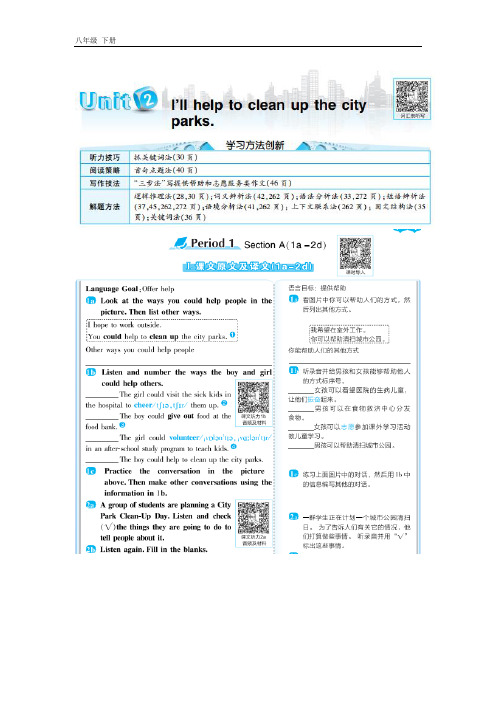
阅读文章It was only the second week of the summervacation. Mario felt bored.Mom was getting ready to go to the food kitchen to help out. She served lunch to people. She worked there three times a week."Why don't you come with me to the food kitchen and help out?" said Mom."I know nothing about working at a food kitchen.""You just watch me, and then you will see how to serve the food."Mario was excited to try working at the food kitchen. He watched Mom put some turkey on a plate. She then gave the plate to the next woman, and she put some bread on the plate. "I can do that, " thought Mario. One of the volunteers left early, so Mario took her place and put salad on the plates. He served thirty people that day. Mario really enjoyed his day at the food kitchen."It gave me something to do, and I felt so good doing it," Mario told Dad when he got home."Mario, you did a nice thing today. You helped many people to have a hot meal, " said Dad.Mario went to bed that night thinking about the food kitchen. "I'm going to help out again, " he thought.试着做一做Information Card答案1.Three times a week.2.She put turkey on the plates.3. Salad.4.Thirty./30.5. Because Mario helped many people have a hot meal.Chronic fatigue therapy 'could help teenagers', study saysA training programme tested on children with mild or moderate chronic fatigue syndrome (CFS) can reduce fatigue and increase attendance at school, a small study from the University of Bristol suggests.The Lightning Process, a type of brain therapy, was used alongside specialist medical care.But ME charities said they did not recommend or endorse the process.The NHS currently recommends behavioural and exercise therapy.Chronic fatigue syndrome (CFS), also known as myalgic encephalomyelitis (ME), is a disabling illness that affects 1% of secondary school children in the UK, causing them to miss a day or more of school per week.In total, it is thought to affect 250,000 people in Britain.Esther Crawley, lead study author and professor of child health at the University of Bristol, decided to research the Lightning Process after the parents of her patients asked her about it in her clinic."I have to say that I never expected it would work," she said.For the Bristol study, published in Journal of Archives of Disease in Childhood, 51 children aged 12-18 years received standard medical care plus three days of the LP training programme, while another 49 received standard care alone.Six months later, the group that received the additional training said they were experiencing less fatigue and anxiety and better physical function than the control group.After a year, the training group also reported they felt less depressed and had spent more days at school, compared with the other group - who also said their symptoms had improved.Prof Crawley said there were limitations to the study - they did not know why LP had worked and could not say whether it would help adults or younger children.And she said more research was needed to find out if the same results could be achieved again and to understand more about the process, before it could be incorporated into NHS care.About 250 youngsters with CFS/ME have therapy each year. Current treatments include:Charities and campaign groups say CFS is not a mental health condition and psychological-based therapies such as the Lightning Process are not going to help.They say people have reported spending huge amounts of money on the training with no obvious benefit, and some have even experienced worsening symptoms.They are calling for more science-based research into the physical causes of chronic fatigue syndrome.Dr. Charles Shepherd, medical adviser for the ME Association, said: "The Lightning Process is not a treatment that we endorse or recommend for people with ME/CFS."It may well be that there are some people with a general fatigue state resulting from stress, emotional or psychological problems who could benefit from a 'mind over matter' retraining approach such as this."But he said this was not to be confused with ME/CFS.He said: "There has been a very significant growth in biomedical research globally into ME/CFS in the past decade which has demonstrated clear abnormalities in brain, muscle and immune system function."The over-simplistic and largely psychological model of ME/CFS causation that is being put forward to patients by Lightning Process practitioners is totally out of step with emerging scientific evidence as toits cause."The ME Association said using children and young people with ME/CFS in trials of this nature was "unethical and potentially damaging to their lives and health".Jane Colby, executive director of the Young ME Sufferers Trust, said: "As a former head teacher, I know that children are vulnerable, especially when they are ill."They desperately want to believe the adults around them, but if their body is telling them something different from what the adults are saying, the child must be in conflict about what to believe."Action for ME said it did not recommend any single form of intervention or treatment for ME and advised people to "examine with scepticism any treatment, therapy or other approach which claims to offer a cure".The National Institute for Health and Care Excellence announced on Tuesday that it would be revising the guidelines on the diagnosis and management of ME/CFS.。
【VIP专享】2012人教新目标八年级下册unit2课文
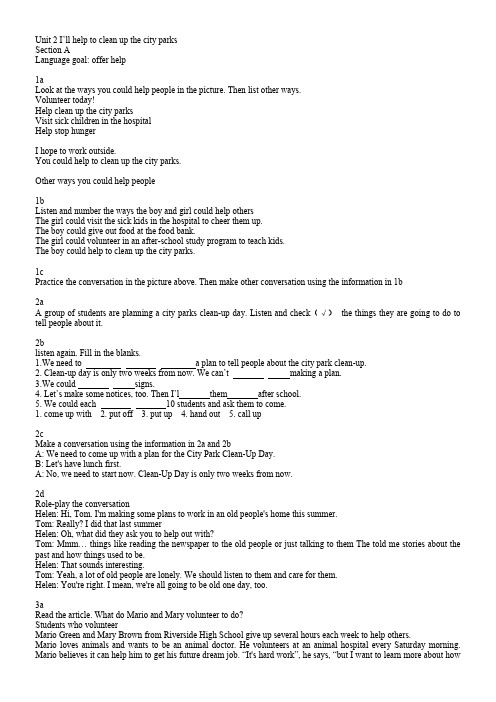
Unit 2 I’ll help to clean up the city parksSection ALanguage goal: offer help1aLook at the ways you could help people in the picture. Then list other ways.Volunteer today!Help clean up the city parksVisit sick children in the hospitalHelp stop hungerI hope to work outside.You could help to clean up the city parks.Other ways you could help people1bListen and number the ways the boy and girl could help othersThe girl could visit the sick kids in the hospital to cheer them up.The boy could give out food at the food bank.The girl could volunteer in an after-school study program to teach kids.The boy could help to clean up the city parks.1cPractice the conversation in the picture above. Then make other conversation using the information in 1b2aA group of students are planning a city parks clean-up day. Listen and check(√)the things they are going to do to tell people about it.2blisten again. Fill in the blanks.1.We need to a plan to tell people about the city park clean-up.2. Clean-up day is only two weeks from now. We can’t making a plan.3.We could signs.4. Let’s make some notices, too. Then I’l them after school.5. We could each 10 students and ask them to come.1. come up with2. put off3. put up4. hand out5. call up2cMake a conversation using the information in 2a and 2bA: We need to come up with a plan for the City Park Clean-Up Day.B: Let's have lunch first.A: No, we need to start now. Clean-Up Day is only two weeks from now.2dRole-play the conversationHelen: Hi, Tom. I'm making some plans to work in an old people's home this summer.Tom: Really? I did that last summerHelen: Oh, what did they ask you to help out with?Tom: Mmm… things like reading the newspaper to the old people or just talking to them The told me stories about the past and how things used to be.Helen: That sounds interesting.Tom: Yeah, a lot of old people are lonely. We should listen to them and care for them.Helen: You're right. I mean, we're all going to be old one day, too.3aRead the article. What do Mario and Mary volunteer to do?Students who volunteerMario Green and Mary Brown from Riverside High School give up several hours each week to help others.Mario loves animals and wants to be an animal doctor. He volunteers at an animal hospital every Saturday morning. Mario believes it can help him to get his future dream job. “It's hard work”, he says, “but I want to learn more about howto care for animals. I get such a strong feeling of satisfaction when I see the animals get better and the look of joy on their owners’ faces”Mary is a book lover. She could read by herself at the age of four. Last year, she decided to try out for a volunteer after-school reading program, She still works there once a week to help kids learn to read “The kids are sitting in the library, but you can see in their that they’re going on a different journey with each new book. Volunteering here is a dream come true for me. I can do what I love to do and help others at the same time.”Mario volunteers at an animal hospital every Saturday morning.Mary works in an after-school reading program once a week to help kids learn to read3bRead the article and answer the questions.1. Why do Mario and Mary volunteer to help others?2. What do they say about volunteering?1. Because they want to do what they love to do.2. Mario thinks volunteering is hard work, but he can get a strong feeling of satisfaction from it. And Mary says she can do what she loves to do while helping others.3cUse infinitives to complete the sentences below.1. Mario would like an animal doctor.2. He works for an animal hospital because he wants about how -for animals.3. Mary decided out for a job at an after-school reading program last year. She still works there now kids learn to read.4. Mary has a dream job because she can do what she loves .1. to be2. to learn, to care3. to try, to help4. to doGrammar focus1. I'd like to help homeless people.2. She decided to try out for a volunteer after-school reading program.3.You could ask hospitals to let you visit the kids and cheer them up.4. Mario believes it can help him to get his future dream job.5. She volunteers there once a week to help kids learn to read.6. I'm making some signs to put up around the school.4aFill in the blanks with the phrasal verbs in the box.put up hand out call up cheer up come up with give out put off1. I want to my plan to work in an animal hospital until next summer. I'm too busy with my studies this year.2. She hopes to at least five primary schools to ask if they need volunteers for their after-school programs.3. Our class is trying to some ideas to sick children because they are often sad.4. We decided to signs around the school and notices to tell students about the book sale.We will the money from the sale to homeless people.1. put off2. call up3. come up with, cheer up4. put up, hand out , give out4bFill in the blanks with the correct forms of the verbs in the boxhelp move do make visit spendMost people today are only worried about getting good jobs 1 lots of money. In their free time, they think about what 2 for fun or relaxation, However, few people think about what they can do 3 others. There are many people who are less lucky than us. Volunteering our time to help these people is a good way 4 our free time. For example, we can make plans 5 sick children in the hospital or raise money for homeless people. Some people even stop doing their jobs for a few months to a year 6 to another country, like Africa, and help people there.1.to make2. to do3. to help4. to spend5. to visit6. to move4cComplete the sentences with your own ideas. Use infinitives1.I’d like to volunteer .2. At 12:00 a.m., I called my friend3. I'm very busy but I could help4. Summer vacation is coming, I want5. I want to travel alone, My parents told me (not)Section B1. I’ve run out of it.2. I take after my mother.3. I fixed it up.4. I gave it away.a. I repaired it.b. I don’t have any more of it.c. I’m similar to her.d. I didn’t keep it.1-4 b c a d1b match the phrasal verbs with the nouns. Then make sentences with the phrases.run out of take after fix give awayideas my bike money my father old clothesrun out of money take after my father fix my bike give away my bike/ old clothesI gave away my bike to a children’s home.I have run out of moneyI fixed my bike yesterdayI take after my fatherI gave away my bike/ old clothes1cListen and number the pictures1-4 in the correct ordera 4b 2 c1 d31dListen again. Circle T for true or F for false.1. Jimmy fixed up broken bicycle parts, like wheels.2. Jimmy sells bikes.3. Jimmy takes after his mother.4. Jimmy has run out of money.1-4 TFFT1eRole-play a conversation between Jimmy and the reporter. Use the information in 1c and 1dA: What do you do, Jimmy?B: I fix up…2aHow do you usually thank someone who helps you? Discuss this with a partner.2bSkim the letter and answer the questions.1. Who wrote the letter to Miss Li? Why?2. What did Miss Li do?Understanding parts of speechKnowing what part of speech a word is (noun, verb, preposition, etc.)can help you understand the word’s meaningI’ll send you a photo of luckyDear Miss Li,I'd like to thank you for giving money to “Animal Helpers”, I’m sure you know that this group was set up to help people like me. You helped to make it possible for me to have Lucky. Lucky makes a big difference to my life. Let me tell you my story.What would it be like to be blind or deaf? Or imagine you can’t walk or use your hands easily. Most people would never think about this, but many people have these difficulties, I can't use my arms or legs well, so normal things like answering the telephone, opening and closing doors or carrying things are difficult for me. Then one day last year, a friend of mine helped me out. She talked to Animal Helpers about getting me a special trained dog. She also thought adog might cheer me up. I love animals and I was excited about the idea of having a dog.After six months of training with a dog at Animal Helpers, I was able to bring him home. My dog's name is Lucky---a good name for him because I feel very lucky to have him. You see, I'm only able to have a “dog-helper” because of your kindness!Lucky is very clever and understands many English words. He can understand me when I give him orders. For example, I say, “Lucky! get my book,” and he does it at once.Lucky is a fantastic dog. I'll send you a photo of him if you like, and I could show you how he helps me. Thank you again for changing my life.Best wishes,Ben Smith1. Ben Smith. Because he wants to send her a photo of Lucky.2. She sent some money to Animal Helpers.2cLook at the list of words blow. Circle the part of speech of each word and make your own sentences with these words. 1. group 2. disabled 3. differences 4. imagine 5. difficulties 6. normal 7. training 8. kindness1. A group of us are going to Beijing.2. We should help the disabled children.3. There are some differences between my brother and me.4. Can you imagine what is in it?5. Are you having any difficulties?6. It’s normal to feel nervous before an exam.7. They haven’t finished training.8. Thank you for your kindness.2dUse information in the letter to make true sentences by matching the different parts.1. Miss Li sent money to Animal helpers.2.Ben Smith is unable to move well.3. Lucky can get animal like Lucky.4. Animal Helpers trains things for disabled people.2eDiscuss the questions with a partner.I. In what other ways do you think dogs are able to help people?2. What other animals can we train to help people?3aLook at these kinds of volunteer work. Can you add more? What would you like to do? Discuss it with a partner. Working in an old people's homeHelping kids in an after-school programBeing a guide at a museum3bWrite a letter or e-mail to the place you want to volunteer at.Which volunteer job do you want to do?What are your interests and hobbies?How can these help you to do the job?Why do you want to do the volunteer job?When are you free to do the job?I'd like to /I'm interested in/ I want to volunteer as …I'm good at /I'm strong in / In my free time, I like to … so I think I'd be good at this job.I want to help out as a volunteer in your old people's home / school/ museum / group because…I'm free to help in/on…Dear Sir or Madam,Yours truly,Fill in each blank with a possible verb to make a phrasal verb.1. cheer , wake , put, take up2. put, take off3. put, take away4. run, go out of5. look, take after6. come up withFill in the blanks with the appropriate phrasal verbs or infinitives.Last Week everyone was trying to cheer up Jimmy, the Bike Boy. He was unhappy because he ran out of money to buy old bikes. He put up some signs asking for old bikes and called up all his friends on the phone to tell them about the problem. He even handed out notices at the supermarket. Then he told the teachers at school about his problem and they set up a call-in center for parents. The ideas that he came up with worked out fine. He now has sixteen bikes to fix up and give away to children who don't have bikes.。
人教新目标八年级下册UNIT 2 Section B 2A-2e
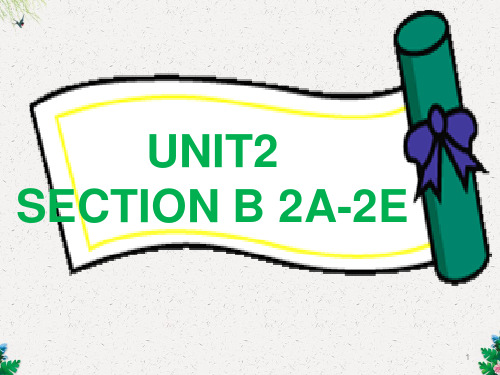
1
2
Dear Miss Li,
I'd like to tank you for giving money to Animal Helpers. I’m sure you know that this group was set up to help disabled people like me. You helped to make it possible for me to have Lucky. Lucky makes a big difference to my life. Let me tell you my story.
Show his thanks again. Lucky is a fantastic dog. I'll send you a photo of him if you like, and I could show you
how he helps me. Thank you again for changing my life.
Para. 4
Para. Para. Para. 4
2
3
A
B
4
• Dear Miss Li,
I'd like to thank you for giving money to Animal Helpers. I’m sure you know that this
Show his thanks and give group was set up to help disabled people like me. You helped to make it possible
Lucky,
Miss Li,
(完整word版)人教版新目标八年级英语下册全册电子版教案,推荐文档

人教版新目标(新)八年级下册电子教案Unit 1What's the matter?第一课时Section A (1a-2d)1.重点单词:matter,back,sore,throat,stomachache,foot,neck,stomach,fever,lie,rest,cough,Xray,toothache,headache2.重点短语:have a sore throat,have a stomachache,have a cold,lie down,take one's temperature,have a fever,go to a doctor3.重点句式:—What's the matter?—She talked too much yesterday and didn't drink enough water.She has a very sore throat now.You should drink some hot tea with honey.It doesn't sound like you have a fever.You need to take breaks away from the computer.I think I sat in the same way for too long without moving.If your head and neck still hurt tomorrow,then go to a doctor.1.重点短语和句型2.询问对方身体状况的句型及答语询问对方身体状况的句型及答语一、预习课本P1-2新单词并背诵,完成下面的汉译英。
1.问题____________ 2.背部____________3.疼痛的____________ 4.嗓子____________5.胃痛____________ 6.脚____________7.脖子____________ 8.胃____________9.发烧____________ 10.平躺____________11.休息____________ 12.咳嗽____________13.X光____________ 14.牙疼____________15.头疼____________二、认真预习1a-2d找出下列短语和句型。
人教版新目标八年级下册英语教案:Unit2WhatshouldIdo?
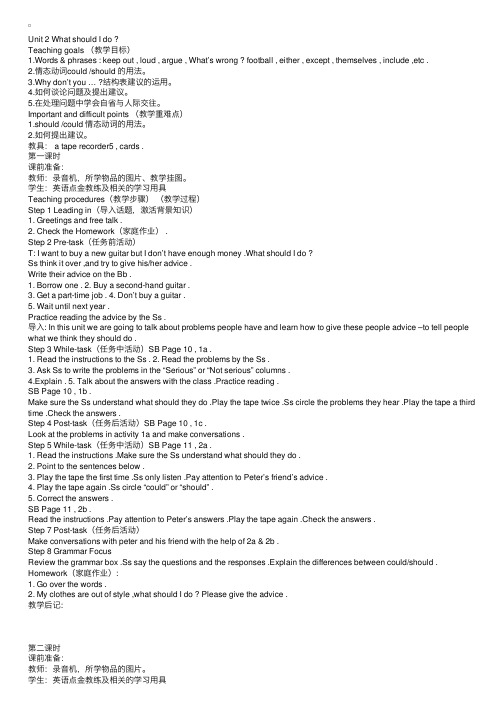
Unit 2 What should I do ?Teaching goals (教学⽬标)1.Words & phrases : keep out , loud , argue , What’s wrong ? football , either , except , themselves , include ,etc .2.情态动词could /should 的⽤法。
3.Why don’t you … ?结构表建议的运⽤。
4.如何谈论问题及提出建议。
5.在处理问题中学会⾃省与⼈际交往。
Important and difficult points (教学重难点)1.should /could 情态动词的⽤法。
2.如何提出建议。
教具: a tape recorder5 , cards .第⼀课时课前准备:教师:录⾳机,所学物品的图⽚、教学挂图。
学⽣:英语点⾦教练及相关的学习⽤具Teaching procedures(教学步骤)(教学过程)Step 1 Leading in(导⼊话题,激活背景知识)1. Greetings and free talk .2. Check the Homework(家庭作业) .Step 2 Pre-task(任务前活动)T: I want to buy a new guitar but I don’t have enough money .What should I do ?Ss think it over ,and try to give his/her advice .Write their advice on the Bb .1. Borrow one .2. Buy a second-hand guitar .3. Get a part-time job .4. Don’t buy a guitar .5. Wait until next year .Practice reading the advice by the Ss .导⼊: In this unit we are going to talk about problems people have and learn how to give these people advice –to tell people what we think they should do .Step 3 While-task(任务中活动)SB Page 10 , 1a .1. Read the instructions to the Ss .2. Read the problems by the Ss .3. Ask Ss to write the problems in the “Serious” or “Not serious” columns .4.Explain .5. Talk about the answers with the class .Practice reading .SB Page 10 , 1b .Make sure the Ss understand what should they do .Play the tape twice .Ss circle the problems they hear .Play the tape a third time .Check the answers .Step 4 Post-task(任务后活动)SB Page 10 , 1c .Look at the problems in activity 1a and make conversations .Step 5 While-task(任务中活动)SB Page 11 , 2a .1. Read the instructions .Make sure the Ss understand what should they do .2. Point to the sentences below .3. Play the tape the first time .Ss only listen .Pay attention to Peter’s friend’s advice .4. Play the tape again .Ss circle “could” or “should” .5. Correct the answers .SB Page 11 , 2b .Read the instructions .Pay attention to Peter’s answers .Play the tape again .Check the answers .Step 7 Post-task(任务后活动)Make conversations with peter and his friend with the help of 2a & 2b .Step 8 Grammar FocusReview the grammar box .Ss say the questions and the responses .Explain the differences between could/should . Homework(家庭作业):1. Go over the words .2. My clothes are out of style ,what should I do ? Please give the advice .教学后记:第⼆课时课前准备:教师:录⾳机,所学物品的图⽚。
(完整word版)八年级英语(下)(人教版)教材听力原文及译文
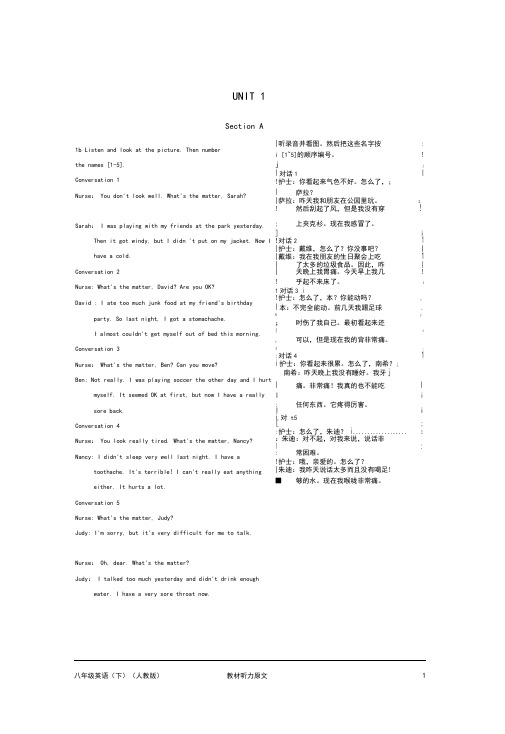
UNIT 1 Section A1b Listen and look at the picture. Then numberthe names [1-5].Conversation 1Nurse: You don't look well. What's the matter, Sarah?Sarah: I was playing with my friends at the park yesterday.Then it got windy, but I didn 't put on my jacket. Now I have a cold.Conversation 2Nurse: What's the matter, David? Are you OK?David : I ate too much junk food at my friend's birthday party. So last night, I got a stomachache.I almost couldn't get myself out of bed this morning. Conversation 3Nurse: What's the matter, Ben? Can you move?Ben: Not really. I was playing soccer the other day and I hurt myself. It seemed OK at first, but now I have a reallysore back.Conversation 4Nurse: You look really tired. What's the matter, Nancy? Nancy: I didn't sleep very well last night. I have atoothache. It's terrible! I can't really eat anythingeither. It hurts a lot.Conversation 5Nurse: What's the matter, Judy?Judy: I'm sorry, but it's very difficult for me to talk.Nurse: Oh, dear. What's the matter?Judy: I talked too much yesterday and didn't drink enough water. I have a very sore throat now.|听录音并看图。
人教版英语八年级下册第二单元
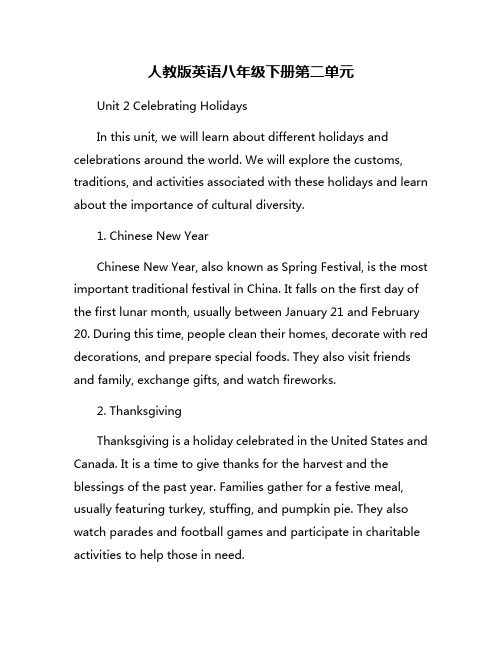
人教版英语八年级下册第二单元Unit 2 Celebrating HolidaysIn this unit, we will learn about different holidays and celebrations around the world. We will explore the customs, traditions, and activities associated with these holidays and learn about the importance of cultural diversity.1. Chinese New YearChinese New Year, also known as Spring Festival, is the most important traditional festival in China. It falls on the first day of the first lunar month, usually between January 21 and February 20. During this time, people clean their homes, decorate with red decorations, and prepare special foods. They also visit friends and family, exchange gifts, and watch fireworks.2. ThanksgivingThanksgiving is a holiday celebrated in the United States and Canada. It is a time to give thanks for the harvest and the blessings of the past year. Families gather for a festive meal, usually featuring turkey, stuffing, and pumpkin pie. They also watch parades and football games and participate in charitable activities to help those in need.3. DiwaliDiwali, also known as the Festival of Lights, is a Hindu festival celebrated in India and by the Indian diaspora around the world. It marks the victory of light over darkness and good over evil. People celebrate by decorating their homes with colorful lights, candles, and flowers. They also exchange sweets and gifts, perform prayers and rituals, and set off fireworks.4. HanukkahHanukkah is a Jewish holiday that lasts for eight days and nights. It commemorates the rededication of the Holy Temple in Jerusalem and the miracle of the oil that lasted for eight days. Families light a special candle holder called a menorah, exchange gifts, play games, and eat traditional foods like latkes and sufganiyot. They also sing songs and recite prayers to celebrate the holiday.5. Eid al-FitrEid al-Fitr is a Muslim holiday that marks the end of Ramadan, the month of fasting. It is a time for feasting, prayer, and giving to charity. Families gather for a special meal, visit friends and relatives, and exchange gifts. They also attendprayers at the mosque, listen to sermons, and enjoy festive activities like shopping and entertainment.In conclusion, celebrating holidays allows us to learn about different cultures, traditions, and values. It helps us appreciate the diversity of the world and the importance of sharing joy and happiness with others. By learning about and participating in different holidays, we can create a more inclusive and harmonious society for everyone.。
- 1、下载文档前请自行甄别文档内容的完整性,平台不提供额外的编辑、内容补充、找答案等附加服务。
- 2、"仅部分预览"的文档,不可在线预览部分如存在完整性等问题,可反馈申请退款(可完整预览的文档不适用该条件!)。
- 3、如文档侵犯您的权益,请联系客服反馈,我们会尽快为您处理(人工客服工作时间:9:00-18:30)。
新目标英语八年级下人教版课文原文WORD版UNIT2
students who volunteer
Mario Green and Mary Brown from Riverside High School give up several hours each week to help others.
Mario loves animals and wants to be an animal doctor. He volunteers at an animal hospital every Sat urday morning. Mario believes it can help him to get his future dream job. “It’s hard work,” he says, “but I want to learn more about how to care for animals. I get such a strong feeling of satisfaction when I see the animals get better and the look of joy on their owners’ faces.”
Mary is a book lover. She could read by herself at the age of four. Last year, she decided to try out for a volunteer after-school reading program. She still works there once a week to help kids learn to read. “The kids are sitting in the library, but you can see in their eyes that they’re going on a different journey with each new book. V olunteering here is a dream come true for me. I can do what I love to do and help others at the same time.”
Dear Miss Li,
I'd like to thank you for giving money to “Animal Helpers”, I’m sure you know that this group was set up to help people like me. You helped to make it possible for me to have Lucky. Lucky makes a big difference to my life. Let me tell you my story.
What would it be like to be blind or deaf? Or imagine you can’t walk or use your hands easily. Most people would never think about this, but many people have these difficulties, I can't use my arms or legs well, so normal things like answering the telephone, opening and closing doors or carrying things are difficult for me. Then one day last year, a friend of mine helped me out. She talked to Animal Helpers about getting me a special trained dog. She also thought a
dog might cheer me up. I love animals and I was excited about the idea of having a dog.
After six months of training with a dog at Animal Helpers, I was able to bring him home. My dog's name is Lucky---a good name for him because I feel very lucky to have him. You see, I'm only able to have a “dog-helper” because of your k indness!
Lucky is very clever and understands many English words. He can understand me when I give him orders. For example, I say, “Lucky! get my book,” and he does it at once.
Lucky is a fantastic dog. I'll send you a photo of him if you like, and I could show you how he helps me. Thank you again for changing my life.
Best wishes,
Ben Smith。
